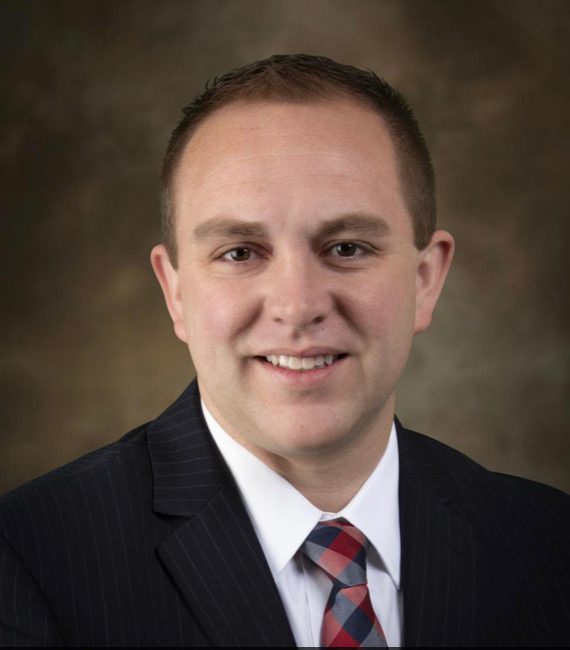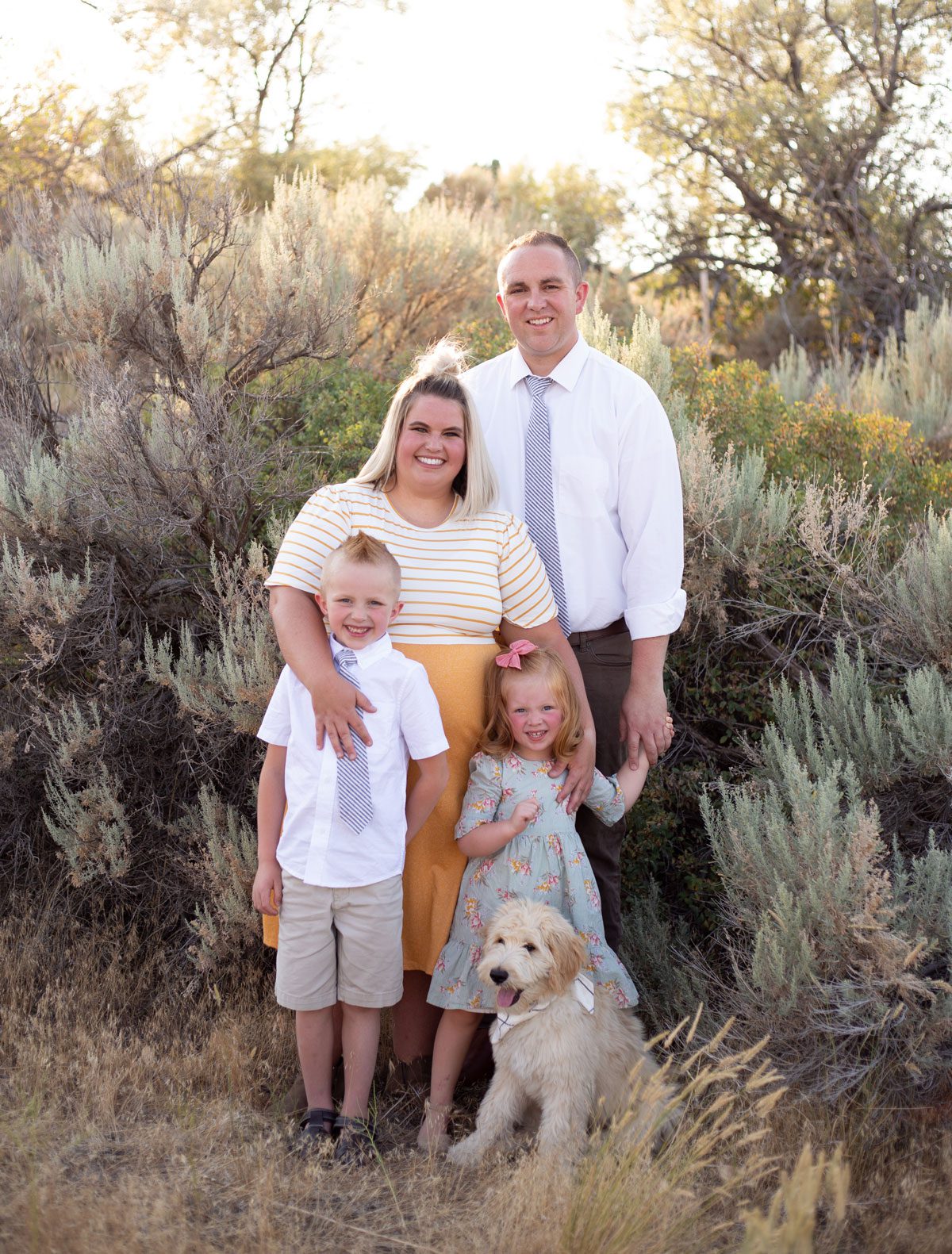One of the strangest things anyone has ever said to Aaron Rowbury was when his grandfather-in-law came up to him one day and said, “Hey, I think you’d make a really good mortician.” But that odd statement has prompted him to learn about the funeral industry, attend mortuary school, and discover a career he genuinely loves. Now, Rowbury is taking the next step in his professional life by earning a master’s degree from the College of Communication and Information with a concentration in strategic digital communications.
Being a mortician isn’t really the stereotype many people think it is, Rowbury said. His wife’s grandfather had approached him with the career idea because Rowbury’s temperament reminded the older man of a friend of his who had been a mortician. After discussing it a bit more, Rowbury’s interest was piqued, and he began working nights part-time as an assistant at a mortuary.
“When you’re not familiar with the funeral industry you think, OK, that sounds weird and scary. But as I researched it and found out more about the industry, I became more interested. The reason I originally wanted to go into psychology was because I wanted to help people that were struggling. While taking care of deceased individuals is a crucial part of the funeral industry, I learned that funeral service is also about caring for loved ones that the decedent leaves behind, walking them through everything, being a support system, and building a lasting relationship with them. That understanding really resonated with me,” he said.

While working part-time nights at the mortuary, he was also fulfilling a full-time day job managing a call center and attending school full-time to fulfill prerequisites for mortuary school.
Looking back, Rowbury said he didn’t know how he managed it, but he’s glad he did. Once he finished his program and became a funeral director, he knew he’d made the right choice.
“It was just super rewarding because I would have people that I served at the funeral home who would reach out after the funeral and say, ‘Hey, can we go to dinner’, or ‘We want to meet your family.’ I still have friends that I stay in contact with because I took care of their loved ones—that’s the side of the funeral industry that people outside of the industry don’t understand. It’s about connecting with people and creating relationships,” Rowbury said. “While it’s taxing and hard because you’re trying to help bear the depth of emotion that comes with the loss of a loved one, I don’t know that there are many other careers that are more rewarding than funeral service.”
Rowbury continued working as a funeral director for several years, his role eventually growing into one where he managed two funeral homes, oversaw training of new funeral directors, handled client and employee issues, and was on call pretty much all the time. As rewarding as his career was, he was missing out on time with his growing family.
He began looking for an option that would allow him to work in the industry but also have a better work-life balance. Rowbury found what he was looking for at the University of Tennessee Health Science Center in Memphis. He is currently a program administrator for the Anatomical Bequest Program, overseeing the cadavers donated to the medical school. This requires him to work with funeral homes across the state to acquire, maintain preservation, and then cremate bodies donated to the program. He also assists in assuring the gross anatomy lab stays operational and functional so students enrolled in the health sciences can have an optimal learning experience.
While he misses the connections he made with families at the funeral home, Rowbury said he loves this job and that he gets to spend time with his wife, Aummie, and their three children, Cougar, Navy, and Grit. This position also gave him the opportunity to pursue more schooling, which is how he landed in the CCI’s master’s program.

Rowbury looked at several options for a master’s degree and found that the program’s asynchronous online concentration in strategic digital communications was a good match for his busy life and his future career options. It dives deeper into what he enjoyed most about his funeral director position, which is connecting and interacting with people. He said another bonus of the program was the institution housing it.
“You hear the name University of Tennessee, and you know it’s a prestigious school, it is well-respected. So, holding a degree from a university like that—not saying other universities aren’t great—but it’s one of the top names in the country,” he said. “So, it’s really cool to think about how, not only am I getting a master’s degree, but I am getting it from the University of Tennessee.”
Though Rowbury is still in his first semester of the program, he said he’s enjoying the two classes he’s taken so far—particularly web design, which he said was “kind of intimidating, but I ended up loving it.” His plan is to take two courses each semester so he can graduate by summer 2025.
The asynchronous program allows students to consume course materials and complete assignments at their own pace, a feature Rowbury likes because he enjoys working ahead. The opposite of a procrastinator, Rowbury said completing assignments in advance allows him to mentally relax and not be so stressed about meeting deadlines.
As someone who came from a family that didn’t promote higher education, Rowbury said another reason he pursued an advanced degree is to show his children first-hand that he values academics. After he earned his associates to become a mortician, he completed his bachelor’s degree in psychology. He jokes about how he keeps going back to school even though he finds school difficult and overwhelming, but at the end of the day, he’s proud of what he has accomplished.
The other major reason Rowbury wanted his master’s is so he can become a teacher. While he was a managing funeral director, he saw there was a lack of licensed funeral directors available, so he found a solution by creating an apprentice development program to train new directors.
“The goal was to help develop them so that, by the time they finished mortuary school, they could be full-fledged independent funeral directors,” he said. “In a lot of funeral homes, apprentices only get to participate in grunt work like cleaning the building or washing the fleet…the ideology is that apprentices have to earn their time in the embalming room and arrangement room. With my development program, I wanted to maximize the potential of the apprentices and ensure their training was both comprehensive and timely. I loved being able to instill in them a love for the industry and help them realize how important their role is.”
He plans to continue at his current position after he graduates, but he also hopes to find a part-time adjunct position where he can teach future funeral directors.
“I don’t know what the future holds, I love my job right now, I really do. But I could see myself doing that in the future, or even becoming a program director for a mortuary science program,” he said.

